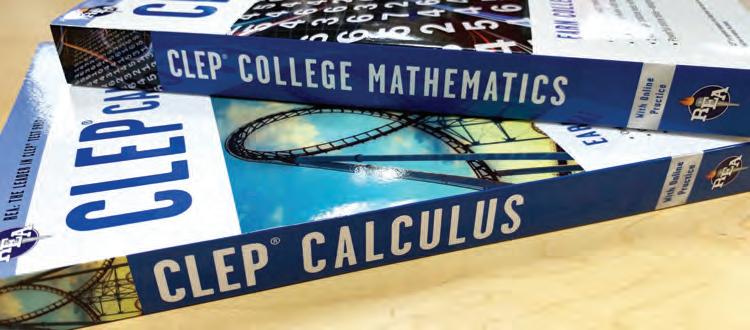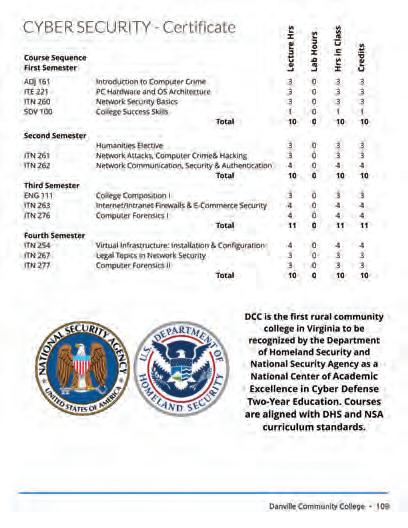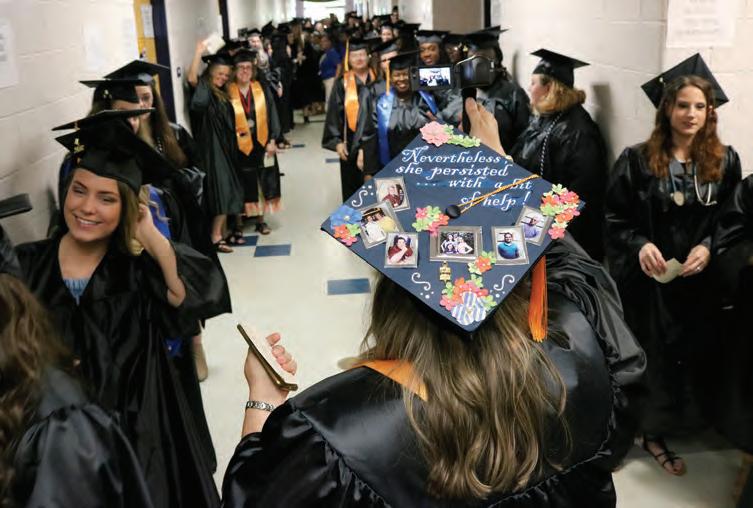
23 minute read
Admissions
DCC has an open admissions policy. Individuals are eligible for admission if they are high school graduates or the equivalent, or if they are 18 years of age or older and able to benefit academically from study at the community college, as demonstrated by assessment in reading, writing and mathematics. However, students may be required to participate in developmental studies before beginning coursework in a particular field of study. Minimum scores are noted in the chart below:
VPT Compass Asset Reading ENF 1 62 35 Writing ENF 1 32 35 Math MTE 1 25 33
Advertisement
Exceptions to this policy may be made by the college president only for documented reasons.
Individuals may be admitted to DCC as curricular or noncurricular students.
Curricular Admission (students taking credit courses, seeking to complete a program of study): 1. Apply online at www.danville.edu/BecomeAStudent. High school transcripts or equivalent are required for admission to the college and/or certain programs. Home school graduates must provide a transcript with a graduation date and may be required to provide documentation of coursework. *Virginia Residents: Please be sure to apply for in-state tuition rates on the application. 2. Demonstrate readiness for program placement.
A. Multiple Measures. In determining students’ readiness for college-level English and math courses, DCC will use the following means and measures. Transcripts and test scores should be sent to admissions@danville.edu or DCC Admissions, 1008 South Main Street, Danville, VA 24541 for review. • Any student who has earned an associate degree or higher, or who has earned a C or better in collegelevel courses in math and/or English at a regionally accredited institution, will be exempt from placement testing, provided they meet the prerequisites for the respective courses in their chosen program of study.
Students must provide transcripts for approval. • Any student who has successfully completed current developmental courses at a VCCS institution will be exempt from placement testing in those areas. • Any student who has successfully completed developmental courses at a non-VCCS institution will have the coursework evaluated for placement.
Students must provide transcripts for approval. • Students enrolling in Career Studies Certificate programs may be waived from placement testing, unless a course in the program requires a reading, writing, or math prerequisite. Please contact the Admissions Office for more information regarding these programs. • A recent (within past 5 years) high school or homeschool graduate may submit a high school/ home school transcript or an approved test score for placement evaluation.
Math Placement Measures#
HSGPA and Algebra II and One Algebra Intensive Course* *Algebra Intensive Courses above Algebra II: Trigonometry, Math Analysis, Pre-Calculus, Calculus, Algebra III. 3.0 or higher
HSGPA and Algebra II
HSGPA or Score Range
3.0 or higher Placement MTE 1-9 Satisfied
MTE 1-5 Satisfied
HSGPA and Algebra I 3.0 or higher MTE 1-3 Satisfied
SAT – Math 530 or above
510-520 range ACT – Subject Area Test Math 22 or above
GED – Math 19-21 range 165 or above
155-164 range MTE 1-9 Satisfied
MTE 1-5 Satisfied MTE 1-9 Satisfied
MTE 1-5 Satisfied MTE 1-5 Satisfied
MTE 1-3 Satisfied
# = Students may complete the VPT – Calculus for placement into Pre-Calculus II, Calculus, and 200-level Statistics. Placement directly into Pre-Calculus II, Calculus, and 200-level Statistics based on HSGPA and highest level courses taken will be at the discretion of the college.
English placement will be determined using one of the following measures.
English Placement Measures HSGPA
SAT-ERW (Evidence-Based Reading and Writing)
ACT-Subject Area Tests English and Reading
GED-English
HSGPA or Score Range
3.0 or higher
2.7-2.9 480 or above
460-470 range 18 or above
15-17 range 165 or above ENG 111 Placement
ENF3/ENG 111 ENG 111
ENF3/ENG 111 ENG 111
ENF3/ENG 111 ENG 111
High school GPA (HSGPA) is valid for five (5) years after the date of high school graduation. SAT, ACT and GED Test scores are valid for five (5) years after the date of the test. Virginia Placement Test-English and Math scores are valid for five (5) years after the date of the test. Previously taken developmental courses will be valid for five (5) years after term taken.
B. Multiple Measures 2.0 for Adult Learners Students who meet the following criteria may not have to take the Virginia Placement Test. Please speak to an academic advisor or counselor. • High school graduate and been a graduate for at least five years or • Active military personnel or veteran; or • Have completed and earned an overall GPA of 2.5 or greater in the Career Studies Certificate that stacks within the chosen degree program.
Students participating in Multiple Measures 2.0 and enrolling in college-level courses without taking the placement test agree to participate in supportive learning assistance if or when they receive a grade below 80% on any major assignment in their class(es) during their first semester. Participation in this program includes the understanding that if the student does not participate in supportive learning assistance, as defined below, and does not earn a final course grade of “C” or better, the student will need to take the college placement test and will be placed in the mathematics or English course designated by the placement test. The placement test will need to be taken before registering for courses requiring prerequisites for the next semester.
C. Virginia Placement Test. Call 434.797.8467 or email admissions@danville.edu to make an appointment. Students are strongly encouraged to complete the online practice test at danville.edu/placementtesting
Placement Testing Policy Students who take the math and/or English Virginia Placement Test and do not enroll in developmental courses are allowed to take one retest within 12 months. Students who attempt a developmental course will be ineligible for a retest. Exceptions to this retest policy may be made on a case-by-case basis in accordance with established college procedures.
3. Attend DCC ROCKS (New Student Orientation) DCC ROCKS (Registration, Orientation, Computer Knowledge and Support) sessions are mandatory for new students prior to the start of classes. After completing an admissions application and demonstrating readiness for program placement, the student should sign up for a DCC ROCKS session at www.danville.edu/DCCROCKS. This is a great opportunity to meet students, faculty and staff, and take care of the following all in one day: • Meet with your an academic advisor and create your class schedule • Learn how to use myDCC • Take a tour of campus • Obtain a DCC Student ID card and parking permit
Admissions to Specific Curricula
In addition to the general admission requirements above, specific requirements are listed for each program of the college where applicable. Among items generally considered in determining students’ eligibility for admission to a curriculum are their educational/ occupational experiences and other reasonable standards to ensure that they can successfully complete the program requirements. Students who do not meet the requirements for a specific program or course may improve chances of eligibility by completing developmental courses.
Non-Curricular Admission (non-program-placed students) Examples include specialized workforce training through an employer, personal interest courses, or courses taken by a student at another institution. Any student wishing to take a single course at the college must satisfy all required prerequisites.
Credit courses 1. Apply online at www.danville.edu/BecomeAStudent. *Virginia Residents: Please be sure to apply for in-state tuition rates on the application.
2. Acceptance by the college does not ensure admission to a specific curriculum or course. Non-curricular students must satisfy all required course prerequisites or placement testing requirements before enrolling in specific college-level courses.
3. Non-curricular students may meet with a DCC counselor to review course options.
Non-Credit Workforce Courses See course schedule and register online at https://dcc. augusoft.net, or call Workforce Services at 434.797.6437.
Readmission Former students who have not been enrolled for a period of three years or more must submit a new application: danville.edu/BecomeAStudent.
Auditing a Course Students desiring to attend a course without taking the examination or receiving credit for the course may do so by registering to audit through the usual registration process and paying the normal tuition. Permission of the division dean or another appropriate academic administrator is required to audit a course. Audited courses carry no credit and do not count as part of the student’s course load. Students desiring to change status in a course from audit to credit or from credit to audit must do so within the add/drop period for the course. Students who desire to earn credit for a previously audited course must re-enroll in the course for credit and pay normal tuition to earn a grade other than “X.” Advanced standing credit should not be awarded for a previously audited course.
Dual Enrollment for High School Students
The major purpose of community colleges is to serve students who have graduated from high school or are beyond the compulsory age limit of the public school and have left public school. However, a qualified high school student may enroll at DCC, subject to the following conditions:
1. Dual Enrollment Partnerships Dual enrollment partnerships are governed by an annually renewable contractual agreement between the school or district and DCC to allow academically qualified high school juniors and seniors to enroll in college courses that are applicable to degree, diploma, certificate, or career studies certificate programs offered at the college. Students from school divisions with whom the college has a current dual enrollment contractual agreement may enroll in college
classes at DCC for dual enrollment credit. Courses taken for dual enrollment credit shall be transcripted on both the student’s college and high school transcripts.
A. High-School Based Dual Enrollment Programs
and Courses DCC and school divisions may develop contractual agreements to offer dual enrollment program pathways, academies, and courses at the high school. Such offerings may be taught by approved high school teachers who meet Virginia Community College System faculty credential requirements and are qualified by the college to teach course(s) in the program of study. DCC faculty and administrators are responsible for identifying high school dual enrollment program offerings; selecting and qualifying high school faculty to teach college courses; professional development of dual enrollment faculty; and oversight and evaluation of program standards, including assessment of student learning outcomes, program learning outcomes and instructional effectiveness.
B. Early College, Dual Enrollment Programs and Academies DCC and school divisions may develop contractual agreements to offer dual enrollment program pathways and academies on the college campus. Such courses are taught by full-time or adjunct community college faculty.
2. Independent Dual Enrollment
(Concurrent/Homeschooled Student Enrollment)
Independent dual enrollment allows individual high school students to enroll in courses at DCC. A qualified high school
Admissions Criteria for Transfer Courses junior or senior may be admitted to any college-level creditbearing course, with permission of the high school principal or designee and the parent. Participation in independent dual enrollment does not require a contractual agreement between the college and the school division. However, the high school student must meet dual enrollment admissions standards. Courses taken as independent dual enrollment shall be transcripted on the student’s college transcript.
Prior to admission, the college must receive a completed Concurrent Enrollment or Homeschooled Student Enrollment Form approved and signed by the student, the student’s parents and high school principal, and be approved by the DCC Admissions Committee. Students interested in independent dual enrollment should contact DCC Admissions.
Dual Enrollment Student Admissions Although high school and home school students are not normally qualified for general admission, DCC may offer admission to those students who meet additional criteria. Dual enrollment is restricted to high school juniors and seniors and home school students studying at the high school junior or senior levels. Home school students must also provide a copy of a home school agreement approved by the school district or a letter from the local school board or a copy of the letter filed by the parent or legal guardian declaring home school. Documentation of parental permission is required for all dual enrollment students.
Because admitting freshmen and sophomores is considered exceptional, the college-ready status of each prospective
English/Writing Reading Writing/Reading Mathematics
Virginia Placement Test (VPT) Compass Asset PSAT SAT ACT SOL
ENG 111 76 43 N/A N/A 18 N/A
ENG 111 81 42 N/A N/A 18 N/A ENG 111 N/A N/A 390 480 N/A N/A MTE 1 25 33 500 530 22 Algebra I - Pass
Admissions Criteria for Career and Technical Courses
English/Writing Reading Writing/Reading Mathematics
Virginia Placement Test (VPT) Compass Asset PSAT SAT ACT SOL
ENF 1 32 35 N/A N/A 18 N/A
ENF 1 62 35 N/A N/A 18 N/A ENF 1 N/A N/A 390 480 N/A N/A MTE 1 25 33 500 530 22 Algebra I - Pass
freshman and sophomore student will be treated on a caseby-case basis. Formal approval by the college president is required for admitting freshmen or sophomores. All students admitted under this section must demonstrate readiness for college by meeting the criteria below.
Students enrolling in a dual enrollment course must meet all course pre-requisites. DCC shall not enroll public or private high school students or homeschooled students in developmental courses.
Senior Citizens Admission Students are classified as senior citizens if they are 60 years of age or older and enrolled in credit or non-credit courses without tuition charge under provisions of the Senior Citizen Higher Education Act of 1974, as amended. To enroll tuitionfree in credit or non-credit courses on a space-available basis, students should meet the following criteria (not to exceed three courses per semester): • Be 60 years of age or older prior to the semester of enrollment; • Be a legal resident of Virginia; • Have had a taxable income not exceeding $23,850 for income tax purposes for the year preceding enrollment (tax documents should be submitted for verification to the DCC Admissions Office); • Must be admitted to the college as a student.
Interested senior citizens should contact the DCC Admissions Office. Interested senior citizens should contact the DCC Admissions Office. Any person meeting the above criteria will be admitted to a course only after all tuition-paying students have been accommodated.
Other Immigrant Status Admission It is the policy of Danville Community College to admit those applicants who are immigrants residing in Virginia who have graduated from a Virginia high school with a high school diploma or equivalent, even if they are not able to document their legal presence. Those who are undocumented will pay tuition at the out-of-state rate. DCC will follow State Council for Higher Education for Virginia Domicile Guidelines for establishing domicile.
Domicile Requirements The Virginia Community College System, including Danville Community College, is guided by the Code of Virginia and the regulations of the State Council of Higher Education on determining domicile. Each student applying for admission must complete a Domicile Determination Form in order to be declared legally domiciled in Virginia. Students must verify that one year before the date of entering the term for which they are requesting in-state tuition status, they have given up any previous domicile and were living in Virginia with the unqualified intention of remaining in Virginia. Please contact DCC Admissions for more information regarding residency requirements. It is the student’s responsibility to submit documentation and provide clear and convincing evidence regarding their domicile. In the event that a student’s circumstances change after a semester has begun, the student’s tuition status may be eligible for reclassification. This reclassification shall be effective for the next academic semester or term following the date of the application for reclassification. Students should follow DCC’s domicile appeal policy.
Domicile Appeals Process A student who disagrees with an initial tuition classification may submit a Domicile Reclassification Form to the Domicile Appeals Committee within 10 calendar days of the initial notification. The committee will respond to the appeal within 15 calendar days. The Domicile Appeals Committee shall consist of two members of the Student Services Office. No person who serves at one level of this appeals process shall be eligible to serve at any other level of this review. If the student still disagrees with the tuition classification, he/ she may file a final written appeal with the Vice President of Academic and Student Services. This written appeal must be made within five calendar days of the student’s notification of the first appeal. The Vice President will notify the student in writing of the final administrative decision within 30 calendar days of receipt of the appeal. A student who is not satisfied with the outcome of the review by the Vice President may appeal to the appropriate circuit court. The student must file a petition for review with the court within 30 calendar days of receipt of the decision by the Vice President of Academic and Student Services.
Policy Related to Legislation Regarding Admissions Language on the admissions application informs applicants that their information is being transferred to the State Police. In the event that the State Police determine that a DCC applicant is listed on the Sex Offender Registry, the State Police will notify DCC. When the college receives such notification, the following procedures apply: 1. The applicant will be denied admission to DCC in accordance with its admission policy as published in this catalog. The decision is final and not subject to appeal. 2. If the applicant registers for classes and becomes a student before the college receives notification from the State Police that he/she is listed on the Sex Offender Registry, the student will immediately be informed that he/she is being administratively withdrawn from classes and will receive a tuition refund. An applicant, in this instance, may invoke his/her right to an appeal process.
Admission Denied / Revoked The college reserves the right to evaluate and document special cases and to refuse or revoke admission if the college determines that the applicant or student poses a threat, is a potential danger, is significantly disruptive to the college community, or if such refusal or revocation is considered to be in the best interest of the college. DCC also reserves the right to refuse admission for applicants who have been expelled or suspended from, or determined to be a threat, potential danger or significantly disruptive by another college. The decision to refuse or deny admission is final and not subject to appeal. Students whose admission is revoked after enrollment will be given due process. Please see Appeal Process for Revoked Admissions.
Appeals Process for Revoked Admission When a student’s admission is revoked, he/she may invoke the appeal process. Students who have registered for class but not yet started classes will be administratively withdrawn, and an appropriate service indicator will be placed on the student’s record, which will prevent the student from registering for classes. If the student is already attending classes, the college will reserve class enrollment until the appeal process is complete, but the individual will not be allowed to attend class during the appeal process. The college will make every effort to expedite the appeals timeline. 1. The student will receive a certified letter/return receipt requested from the Dean of Student Support Services or designee notifying the student of the revoked admission and outlining the appeal process. 2. Student may write a letter of appeal to the Dean of Student Support Services in which he/she (1) provides justification for consideration of admission/ reinstatement and (2) discloses the nature of the offense and/or conviction serving as the basis for DCC’s action to revoke admission. If the student is a convicted sex offender, the letter should include a statement acknowledging his/her understanding that his/her identity and status as a convicted sex offender will be publicized on the college campus in accordance with federal and state law if he/she is admitted or reinstated.
The letter of appeal must be submitted to the Dean of Student Support Services within seven (7) business days of notification by the college.
3. A panel of five (5) full-time faculty or administrators will review the information submitted and make a decision by a simple majority vote within fourteen (14) business days of receiving the letter of appeal. The Dean of Student Support Serviceswill serve as the convener of the panel and will be a member of the panel. Panel discussions will be confidential. 4. If the panel determines that the withdrawn student represents a threat or potential danger to the college and/or the revoked admission/ withdrawn enrollment is considered to be in the best interest of the college, the following apply: a. The student’s admission to the college will remain revoked b. The student will be administratively withdrawn from classes, if classes have been held c. An enrolled student will receive a tuition refund. Tuition refunds will not be granted for students removed from the college for disciplinary reasons. 5. The Dean of Student Support Services will inform the student by certified letter/return receipt requested of the decision of the appeals panel. The decision of the appeals panel shall be final.


Advanced Standing Credit Advanced standing is the administrative placement of a student that awards credit for subject matter competency based upon previous academic study or occupational experience. This may include, but is not limited to, college credit and advancement based upon individual college participation in the Advanced Placement Program (AP), International Baccalaureate Organization (IBO), or testing through the College Level Examination Program (CLEP) or the DSST Program (formerly known as DANTES); training provided by non-collegiate institutions, such as the armed forces; professional certification, or experiential learning/ work experience. For more information or for score requirements: Danville.edu/advanced-standing-credit
AP (Advanced Placement) Many area high schools offer AP or honors courses to their students, giving them the opportunity to complete collegelevel work while attending high school. A minimum AP score of 3 is required for credit at DCC. An official copy of the AP transcript must be submitted to the DCC Admissions Office in order to obtain credit. Unofficial, student copies, or high school transcripts noting the AP credit will not be accepted for credit at DCC.
CLEP (College Level Examination Program) CLEP is a national program of credit-by- examination that offers students the opportunity to obtain college credit for prior academic achievement. DCC accepts most of the CLEP-offered exams and uses the American Council on Education recommended minimum score of 50 for awarding CLEP credit. An official copy of the CLEP transcript must be submitted to the DCC Admissions Office in order to obtain credit. Unofficial or student copies of transcripts will not be accepted for credit. CLEP examinations are not offered through DCC.
IBO (International Baccalaureate) Students who have completed the Standard Level certificate with a score of 5 to 7 in the International Baccalaureate program may be granted advanced standing credit for a variety of courses. Students requesting IB credit must have an official transcript sent from the IBO to the DCC Admissions Office in order to be considered for credit.
Police Academy Certificates
Per the Articulation Agreement between the VCCS and the Virginia Dept. of Criminal Justice Services, students who have satisfactorily documented successful completion of the VA State Police Academy or a Regional and Independent Certified Training Academy shall be awarded credit. Appropriate documentation is required and must be submitted to the Dean of Art, Sciences, & Business.
Credit for Military Training A student’s military training, courses, and occupational specialty can all be considered for college credit. As a participating member of Service members Opportunity Colleges (SOC), DCC follows the American Council on Education’s (ACE) Guide to the Evaluation of Educational Experiences in the Armed Services in determining the value of learning acquired in military service when applicable to the service member’s program of study. Military service credit in the occupational/ technical areas (i.e., Engineering, Health Technology) may require approval by the division dean prior to award. Credit may be granted for prior learning for non-collegiate education, training, and/or occupational experiences as recommended by college faculty, ACE, the National College Credit Recommendation Service, or another college-approved organization.
In addition to the above, DCC may award academic credit to any enrolled student who has successfully completed a military training course or program as part of the student’s military service that is applicable to the certificate or degree requirements and is: a) Recommended for academic credit by a national higher education association that provides academic credit recommendations for military training courses or programs; b) Noted on the student’s military transcript issued by any of the U.S. Armed Forces; or c) Otherwise documented in writing by any of the U.S. Armed Forces. In order to receive credit for military training, the student must submit a military transcript which includes
the ACE recommended credit, and initiate a request for evaluation to the DCC Admissions Office. Note: If the student submits only the DD214 and no military transcript, only credit for HLT/PED electives will be awarded. Students who have completed basic training, regardless of the date of military experience, may receive credit for HLT/PED electives. Each branch of the service has its own transcript request service.
Previous Completion Credit (Work Experience/ Experiential Learning Credit) Students may be awarded college credit if they can demonstrate previous educational study or training/work experience that entitles them to credit for specific courses applicable to their program of study. Documentation for special training or experience must be submitted with the request for credit and will be retained in the student’s file. The supporting documentation must include samples of work or projects completed. Students wishing to be awarded previous completion credit for a specific course should contact the appropriate division office in which the course is taught. DCC reserves the right to place a time limit on prior learning experiences for which advanced standing may be granted. The division dean, in consultation with the admissions coordinator, will determine if courses taken more than five years previously can be used in the student’s current program of study.
Using Advanced Standing for Graduation Requirements There is no limit to the number of credits that may be awarded through advanced standing credit, with the exception of portfolio-based credit for prior experiential learning. Credit for portfolio-based prior experiential learning may be awarded for no more than 25% of the credit hours required for a degree. In addition, credit achieved through advanced standing may not be used to fulfill the graduation residency requirement. A minimum of 25% of the credit required for graduation in the curriculum must be earned at DCC. All accepted advanced standing credits will be acknowledged and recorded on the student’s permanent record with the transferring agency or other source of credit identified. No unsuccessfully attempted advanced standing applications or examination results will be recorded on the student’s permanent record.
The following shall apply: 1. To earn credit for prior learning, student must be admitted to the curriculum in which advanced standing is requested. 2. Advanced standing will be awarded only for courses in which a student is not currently and has not been previously enrolled.
Course Acceptance Policy 1. The program administrator responsible for evaluating a student’s previous coursework shall: a. Determine the acceptability of each course the student wishes to transfer or apply toward the program requirements based upon his/her knowledge of any changes that have occurred since the course(s) was completed; b. Give particular attention to courses in areas that have had significant technological changes in recent years (e.g., electronics, automotive, graphic imaging, information systems, administrative support technology, etc.); c. As deemed appropriate, seek the input of faculty or other administrators regarding the proper course of action.
2. Courses which are determined to have outdated information and whose acceptance would not assure the student of having current skills may be used to meet elective credit requirements.
3. Students who have kept their educational training current through their job activities may have their coursework given special consideration for acceptance.
4. A student who wishes to challenge the non-acceptance of his/her coursework may do so by demonstrating his/her competencies in an appropriate manner to the administrator or appropriate faculty member.
5. Because of the diversity of courses offered and the differences in changes that occur over a given time, no specific time frame can be established for courses whose content may have become obsolete. However, it is recommended that all courses taken more than five years ago be carefully reviewed for their current relevance.
6. The decision to accept/not accept a course(s) should be made with the idea that a student’s graduation indicates








